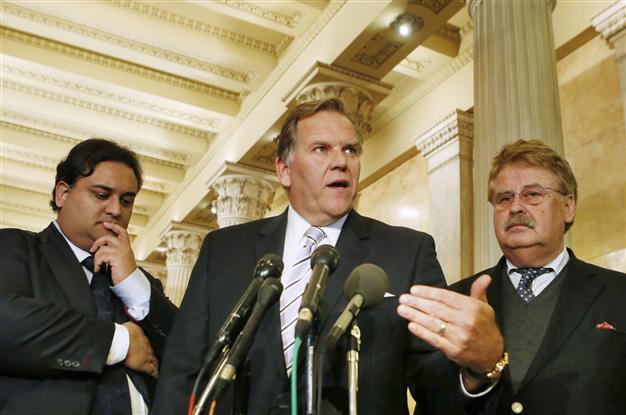EU to US: 'Confidence is damaged' amid spy row

Chairman of the House Permanent Select Committee on Intelligence U.S. Rep. Mike Rogers (C) speaks about a closed door meeting on NSA surveillance on US allies while on Capitol Hill in Washington. REUTERS Photo
Decades of mutual trust have been breached and will need repair as a result of mass US eavesdropping on allies, European parliamentarians told a US lawmaker Oct. 28 amid a swirling espionage scandal.US House Intelligence Committee chairman Mike Rogers emerged from the one-hour talks to pledge that US lawmakers will travel to Brussels "very, very soon" for another round of meetings.
But the European visitors seethed over reports that the secretive National Security Agency tracked German Chancellor Angela Merkel's phone for as long as a decade and that it may have scooped up data on 60 million Spanish telephone calls in a single month.
"Confidence is damaged," Elmar Brok, chairman of the European Parliament Committee on Foreign Affairs, told reporters, with Rogers at his side.
"It is not acceptable, for example, this espionage on Chancellor Merkel and others since more than 10 years." Reports that Merkel's phone was tapped has caused a crisis in US-German relations. President Barack Obama called the chancellor to reassure her that US agents were not currently eavesdropping on her.
With transatlantic tensions on the boil, British Labour member of the European Parliament Claude Moraes said it was vital to begin a healing process but also to reassure that surveillance abuses do not persist.
"Trust has to be rebuilt. We need to figure out why this kind of mass surveillance activity is happening," Moraes said, adding that the allegations have "caused genuine, lasting concern" among Europeans.
"We believe that this disconnection that's going on suggests that perhaps there isn't a sufficient appreciation perhaps of the lack of privacy that European citizens feel after the last several years," he said.
Rogers said he believed the sides "made some progress" in their talks.
"We're starting to highlight some areas where we think we can work together to cover our differences, protect our relationship between our EU allies and the United States, and still protect the ability to collect information that keeps both our allies and the United States safe."
But he also stressed the need for "making sure we get what the facts are versus what the perceptions are."
In an interview with AFP, Germany's Brok complained that Washington "did not tell the whole truth" when Europeans first questioned NSA activities this summer.
He blasted US intelligence agencies for siphoning off people's data and "systematically" spying on leadership of other countries.
"I believe that the American approach to listen in on the German administration is a breach of German law," Brok said.
The US intelligence community appears to be "a state within a state," he said, adding that the post-9/11 obsession with security risks were pushing individual liberties to the margins.
"I think this balance needs to be re-established," Brok said.
















